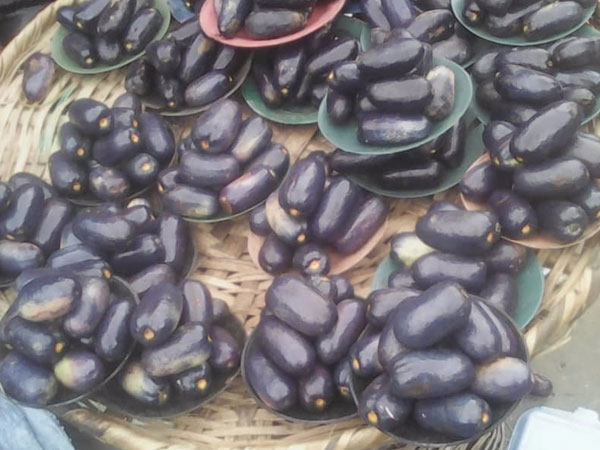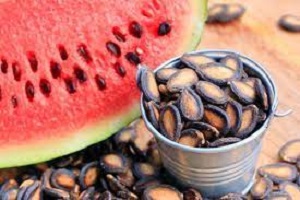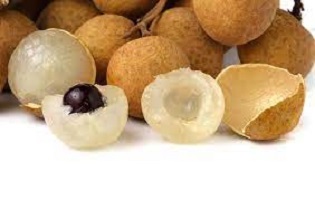African Pear and Diabetes
African Pear and Diabetes
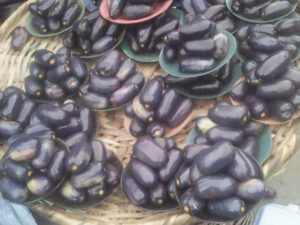
Dacryodes edulis, also known as African pear, safou, atanga, and popularly known as Ube in the South Eastern part of Nigeria, is a medium-sized, evergreen tree that belongs to the Burseraceae (Frankincense family) and is distinguished by an ovary of 2 to 5 cells, which is visible in ducts in the bark, wood, and intra-staminal disc.
The plant is indigenous to the Gulf of Guinea and is widely cultivated in other tropical Central African countries.
The natural range includes Angola in the south, Nigeria and Sierra Leone in the west, and Uganda in the east. It is also grown in Malaysia.
Bush Butter Tree, Butterfruit, African Plum, bush pear, bush plum, safou, Native pear, African pear, Ajong, Elemi, Ube mbu, Safu, African pear tree, Bush butter, Bush fruit tree, Eben tree, atanga, ube, and nsafu are some of the common names for the plant.
Description ~ African Pear and Diabetes
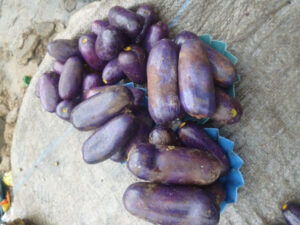
Ube is a hypoallergenic fruit with an indigo-colored covering over a greenish pulp and a firm seed inside.
It’s typically served with roasted or cooked corn. When unripe, it is pink, but when ripe, it turns dark purple.
When roasted or dipped in hot water, it has a buttery flavor that everyone enjoys.
The fruit is well-known in African countries. It is known as Ube in Nigeria, Safou in Cameroon, Atanga in Equatorial Guinea and Gabon, African plum, Butternut tree, and Bush pear in other countries.
The purple skin and pulp are eaten, but the seed is thrown away. It’s usually boiled or roasted, and it’s served with freshly roasted corn.
Ube is extremely nutritious and healthy.
Can People with Diabetes Eat Pears? Is African pear good for diabetics?
Fruits have many health benefits for people with diabetes, but it’s important to consider portion size, overall carbohydrate consumption, and the food’s glycemic index.
Pears are a delicious fruit that is also good for diabetics. Many studies show that their nutritional benefits can actually help you manage the condition.
Pears also have a low glycemic index, which means they won’t spike your blood sugar too quickly.
It’s a common misconception that people with diabetes can’t eat fruit. Fruits do contain carbohydrates, which many diabetics may try to avoid.
They do, however, contain numerous beneficial vitamins, minerals, and nutrients that can contribute to a healthy diet.
Between April and September, African pear is a delicious seasonal fruit delight
Health benefits of local pear (ube) ~ African pear benefit
While it appears that corn and pears have been raining this season, studies have shown that the African pear contains essential ingredients for disease prevention and can help protect women against postmenopausal breast cancer.
Reduces the risk of Diabetes ~ African Pear and Diabetes
African pears are high in vitamins and minerals, which help to regulate blood sugar levels.
Carbohydrate content in African pears has a low Glycemic Index (GI) and is slowly digested and metabolized, which prevents blood glucose levels from spiking, which causes diabetes.
Rich in Nutrients
Nutrient-dense African pears are high in nutrients. You will get the following nutrients from 100 grams of fruit pulp:
- Protein:20 grams (g)
- Fats: 48 g
- Dietary fiber:3 g
- Carbohydrates:15 g
- Vitamin C: 3 g
- Calcium:133 milligrams (mg)
- Potassium:65 mg
- Sodium:10 mg
- Zinc:13 mg
African pears have a high protein content that is uncommon in fruits. It contains healthy fats such as palmitic acid, linoleic acid, and stearic acid.
Vitamin C, calcium, potassium, zinc, magnesium, folate, magnesium, and sodium are also abundant in fruits.
Eating nutrient-dense foods such as Ube will strengthen your immune system, prevent disease, and promote healthy cell growth.
Here are five health benefits of the African Pear;
Fights against cancer
In the last three decades, studies have shown a direct link between increased fiber intake, which is found in ube, and a decrease in colon cancer, which could be due to the fiber or other nutrients like vitamins, minerals, phytochemicals, and essential fatty acids
Bones and teeth are strengthened.
The African pear is also high in calcium and phosphorus, which are minerals found primarily in our bones and teeth. Ube has also been linked to the prevention of stiff joints and bone pain.
Aids in the maintenance of healthy skin
While it contains a high concentration of vitamin C, which works to protect cells from free radical damage even more than other fruits like oranges and lemons,
Ube also helps to improve the texture of your skin by smoothing it and reducing wrinkles.
Good for the heart
Ube also contains a lot of soluble fiber, which reduces cholesterol and bile acid absorption from the small intestines, lowering blood cholesterol levels.
Prevents constipation
Ube, which is also high in fiber, adds bulk to the stool, making bowel movements easier. Other uses of the African pear
Although the fruit pulp is the most commonly consumed part of the African pear, the plant’s other parts are high in phytochemicals and can be used to treat diseases.
Seeds
The seeds of the fruit are particularly high in flavonoids and alkaloids, two important phytochemicals that, when extracted, can be used to treat bacterial and fungal infections.
Flavonoids are also powerful antioxidants that can help protect the body from cell damage.
Leaves
African medicine has used the leaves of the African pear to treat malaria, vomiting, and skin infections.
Recent research has supported this practice by demonstrating the presence of alkaloids with potent antimicrobial activity
Bark
The bark is used to treat wounds and prevent infection in some African countries, including Gabon. It is used as a medicine in other countries to treat leprosy, tonsillitis, skin diseases, and body pains.
The bark resin can also be used to treat parasitic infections. It is commonly used as a glue, thickener, and emulsifying agent in the food and cosmetic industries. Oils
The African pear fruit pulp and seed are high in essential oils and healthy fats.
Fatty acids such as palmitic acid, linoleic acid, oleic acid, and stearic acid are extremely beneficial in both industrial and nutritional applications.
The fruit also contains essential oils, which are useful in the cosmetic and wellness industries.
It contains approximately 1.5% essential oils, the main constituents of which are -pinene, -terpineol, myrcene, and germacrene-D
Pregnancy and African pear – Is African pear safe to eat during pregnancy?
The African pear is a superfruit for pregnant women. It contains natural folic acid, which is beneficial during pregnancy
The presence of folic acid in African pears aids in the prevention of deficiencies in the brain and spinal cord of a baby.
Fertility and the African pear
The African pear is a superfruit for pregnant women. It contains natural folic acid, which is beneficial during pregnancy.
The presence of folic acid in African pears aids in the prevention of deficiencies in the brain and spinal cord of a baby.
The Bottom Line on The African Pear and Diabetes
The African pear (Ube) is a nutritious fruit to include in your diet.
It is high in protein, fats, carbohydrates, vitamin C, potassium, calcium, zinc, and antioxidants, which aid in body repair and immunity.
Furthermore, it is versatile, simple to prepare, and delicious as a snack or main course
People also ask about African Pear and Diabetes
Is African Pear (Ube) high in fat? Fattening
African pear does not contribute to obesity; it is not fattening because it contains healthy lipids but no cholesterol.
On the other hand, it contains natural carbohydrates and sugar in small amounts, which can help with the problems of overweight people.
This variety of pear goes well with boiled or roasted corn. It grows abundantly during the maturation of maize.
What are the side effects of pears?
Indigestion. Vomiting and nausea Scarring of the liver (cirrhosis). Obesity.
Is the African pear Ube healthy/good for diabetics? African Pear and Diabetes
The African pear’s purplish skin and greenish pulp contain potent antioxidants known as carotenoids, which may help prevent diseases such as diabetes, heart disease, and cancer
The leaves are also high in flavonoids, a powerful antioxidant that aids in the fight against free radical damage.
What effects does African Pear have on the body?
Strengthens bones and teeth
The African pear is also high in calcium and phosphorus, which are minerals found primarily in our bones and teeth.
Ube has also been linked to the prevention of stiff joints and bone pain.
African pear vs. avocado ~ what is the difference between pear and avocado?
Persea Americana is the scientific name for avocado, while Pyrus communis is the scientific name for pear.
Moving up the classification hierarchy, avocado is in the Lauraceae family, whereas pear is in the Rosaceae family.
As a result, these two crops are diametrically opposed
Will pears help to lower blood sugar levels?
Pears can also help control blood sugar and lower your risk of type 2 diabetes and stroke. They can even improve your digestion.
They’re also a good way to feel like you’ve had a small treat with some added nutrition.
Is African pear safe to eat? Is it healthy?
African pears have medicinal properties that allow alternative medical doctors to use them to treat a variety of illnesses such as fever, wounds, dysentery, skin diseases, and others.
According to scientific studies, this African pear contains significant nutrients that the body requires on a daily basis
What fruits should diabetics avoid?
Fruit is a good source of vitamins, minerals, and fiber. Fruit, on the other hand, can be high in sugar.
To avoid blood sugar spikes, diabetics must keep a close eye on their sugar intake
These include:
- Apples
- Blackberries
- Cantaloupe
- Cherries
- Apricots
- Avocados
- Banana
What is the best fruit for diabetics? African Pear and Diabetes
The Best Fruits for People with Diabetes
- Berries – Both citrus and berries are recommended as superfoods by the American Diabetes Association.
- Cherries
- Pears
- Kiwi
- Plums
- Grapefruit
- Peaches
- Apples – High-fiber fruits like apples and pears help to slow a spike in blood sugar
Is Ube good for diabetics? African Pear and Diabetes
Purple yam flavonoids may aid in blood sugar control in people with type 2 diabetes.
Purple yams also have a low glycemic index, which helps to prevent blood sugar spikes.
Are you ready to take your healthy lifestyle to the next level?
Can you eat an African pear raw?
The African pear can be eaten raw, in salt water, or roasted.
How should an African pear be eaten?
Serve the hot water alone or with boiled corn. Another good method is to bring the water to a boil before adding the pears.
Remember to keep the pot tightly covered once the pear is heated. This method is especially useful when eating ube with roasted corn
What is the best type of pear for diabetics? African Pear and Diabetes
Consuming pears, along with a healthy diet, may also help control early-stage diabetes. One study discovered that eating Bartlett and Starkrimson pears whole could help prevent and manage type 2 diabetes.
How many pears can a diabetic consume in a day?
The Dietary Guidelines for Americans recommend that you consume two pears per day to meet your fruit needs.
What foods can diabetics eat freely?
List of Diabetic-Friendly Foods:
- Carbonated water.
- 1 Tbsp. unsweetened cocoa powder
- Coffee or tea.
- 1 cup raw cabbage.
- Hard, sugar-free candy.
- 1 cup raw cucumber.
- 2 Tbsp. whipped topping.
- 1 cup raw salad greens and lettuce
What conditions does pear leaf treat?
Avocado pear leaf raw liquid extract has medicinal value in the treatment of hypertension.
This extract is being used as an alternative therapy in the treatment of hypertension in human subjects in the Oke-Ogun area of Oyo state.
What is the spiritual meaning of the fruit pear?
We can find references to the fruit of the Pear tree as a symbol of divine sustenance, abundance, and longevity in many cultures dating back thousands of years.
For centuries, the pear shape has represented the female form in the art world, creating a strong symbol of fruitfulness and femininity.
How many calories does one African pear contain?
101 calories are contained in one medium pear weighing approximately 178 grams (g). 0.285 grams of fat
Meaning of eating African pear in the dream
Dreaming of an African pear may indicate that you need to make a change.
The African pear represents change and the ability to let go of something that no longer serves one’s highest good.
Pears frequently represent one’s decisions and allow one to choose between what one wants to do and what should be done
How many calories are there in an African pear fruit?
Nigerian pears are also high in fatty acids such as palmitic acids, oleic acids, and linoleic acids. Nigerian pear calories per 100g are 40.3.
It also has a high concentration of essential amino acids such as Lysine, Phenylalanine, Leucine, and Isoleucine, according to the amino acid profile.
